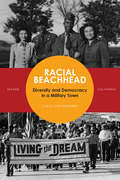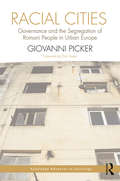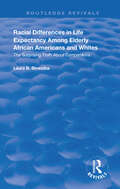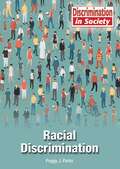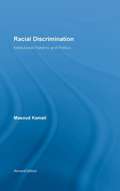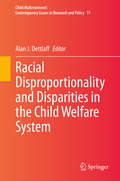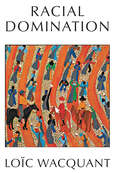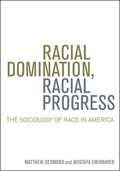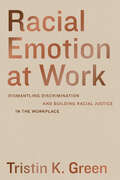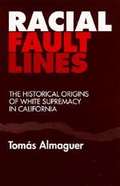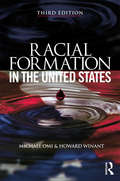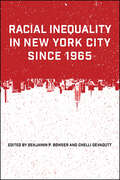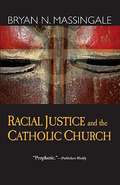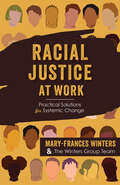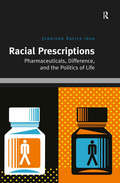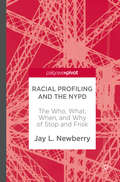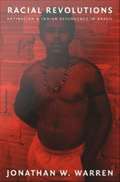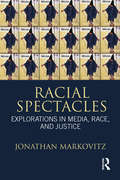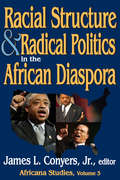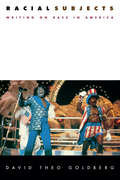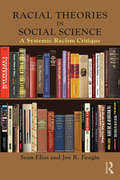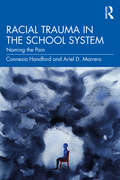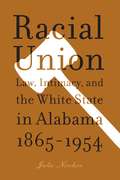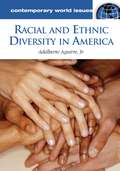- Table View
- List View
Racial Beachhead
by Carol Lynn MckibbenIn 1917, Fort Ord was established in the tiny subdivision of Seaside, California. Over the course of the 20th century, it held great national and military importance—a major launching point for World War II operations, the first base in the military to undergo complete integration, the West Coast's most important training base for draftees in the Vietnam War, a site of important civil rights movements—until its closure in the 1990s. Alongside it, the city of Seaside took form. Racial Beachhead offers the story of this city, shaped over the decades by military policies of racial integration in the context of the ideals of the American civil rights movement. Middle class blacks, together with other military families—black, white, Hispanic, and Asian—created a local politics of inclusion that continues to serve as a reminder that integration can work to change ideas about race. Though Seaside's relationship with the military makes it unique, at the same time the story of Seaside is part and parcel of the story of 20th century American town life. Its story contributes to the growing history of cities of color—those minority-majority places that are increasingly the face of urban America.
Racial Cities: Governance and the Segregation of Romani People in Urban Europe (Routledge Advances in Sociology)
by Giovanni PickerGoing beyond race-blind approaches to spatial segregation in Europe, Racial Cities argues that race is the logic through which stigmatized and segregated "Gypsy urban areas" have emerged and persisted after World War II. Building on nearly a decade of ethnographic and historical research in Romania, Italy, France and the UK, Giovanni Picker casts a series of case studies into the historical framework of circulations and borrowings between colony and metropole since the late nineteenth century. By focusing on socio-economic transformations and social dynamics in contemporary Cluj-Napoca, Pescara, Montreuil, Florence and Salford, Picker detects four local segregating mechanisms, and comparatively investigates resemblances between each of them and segregation in French Rabat, Italian Addis Ababa, and British New Delhi. These multiple global associations across space and time serve as an empirical basis for establishing a solid bridge between race critical theories and urban studies. Racial Cities is the first comprehensive analysis of the segregation of Romani people in Europe, providing a fine-tuned and in-depth explanation of this phenomenon. While inequalities increase globally and poverty is ever more concentrated, this book is a key contribution to debates and actions addressing social marginality, inequalities, racist exclusions, and governance. Thanks to its dense yet thoroughly accessible narration, the book will appeal to scholars, undergraduate and postgraduate students, postdoctoral researchers, and equally to activists and policy makers, who are interested in areas including: Race and Racism, Urban Studies, Governance, Inequalities, Colonialism and Postcolonialism, and European Studies.
Racial Differences in Life Expectancy Among Elderly African Americans and Whites: The Surprising Truth About Comparisons
by Laura B. ShresthaFirst published in 1997. This book is based on the author’s dissertation written while a student in the Population Studies Center of the University of Pennsylvania. The catalyst for the research was the recognition that major uncertainties exist about the quality of population and death data for the elderly in the United States as a result of coverage and content errors in the censuses and death registration. Furthermore, different patterns appear to exist for the two major racial groupings in the United States: whites and African- Americans. The book evaluates the consistency of reported data between the two major sources of data for calculation of mortality statistics in the United States: censuses and death registration. The focus is on the older population (aged 60 and above), where mortality trends have the greatest impact on social programs and where data quality is most problematic.
Racial Discrimination (Discrimination in Society)
by Peggy J. ParksThe term "racial discrimination" refers to people being treated unequally and unfairly solely because of their race. Although it is a considered a problem throughout the United States, not everyone agrees about the seriousness of it. <p><p> Racial Discrimination examines what this discrimination entails, how it is manifested, how widespread it is, how it affects real people, and efforts to address this discrimination.
Racial Discrimination: Institutional Patterns and Politics (Routledge Research in Race and Ethnicity)
by Masoud KamaliThere is an institutionalized dilemma in Europe that counteracts social cohesion and stability. It is a result of the collision and incompatibility between declarations of universal values (such as human rights and democracy) and institutionalized actions which exclude and discriminate against Europeans of immigrant background and against ethnic minorities. This book analyzes the institutional patterns and politics of ‘racial’ discrimination in modern-day Europe. Based on a research project that has been carried out under the leadership of the author in eight European countries, Racial Discrimination seeks the answers to some of the key questions posed by the latest developments in European political and public spheres concerning immigration and the increase in xenophobic sentiments and parties. The book will appeal to all social and political scientists interested in the latest political developments in Europe and in the problems of democratic citizenship and the efforts to move toward an integrated European community.
Racial Disproportionality and Disparities in the Child Welfare System (Child Maltreatment #11)
by Alan J. DettlaffThis volume examines existing research documenting racial disproportionality and disparities in child welfare systems, the underlying factors that contribute to these phenomena and the harms that result at both the individual and community levels. It reviews multiple forms of interventions designed to prevent and reduce disproportionality, particularly in states and jurisdictions that have seen meaningful change. With contributions from authorities and leaders in the field, this volume serves as the authoritative volume on the complex issue of child maltreatment and child welfare. It offers a central source of information for students and practitioners who are seeking understanding on how structural and institutional racism can be addressed in public systems.
Racial Domination
by Loïc WacquantRace is arguably the single most troublesome and volatile concept of the social sciences in the early 21st century. It is invoked to explain all manner of historical phenomena and current issues, from slavery to police brutality to acute poverty, and it is also used as a term of civic denunciation and moral condemnation. In this erudite and incisive book based on a panoramic mining of comparative and historical research from around the globe, Loïc Wacquant pours cold analytical water on this hot topic and infuses it with epistemological clarity, conceptual precision, and empirical breadth.Drawing on Gaston Bachelard, Max Weber, and Pierre Bourdieu, Wacquant first articulates a series of reframings, starting with dislodging the United States from its Archimedean position, in order to capture race-making as a form of symbolic violence. He then forges a set of novel concepts to rethink the nexus of racial classification and stratification: the continuum of ethnicity and race as disguised ethnicity, the diagonal of racialization and the pentad of ethnoracial domination, the checkerboard of violence and the dialectic of salience and consequentiality. This enables him to elaborate a meticulous critique of such fashionable notions as “structural racism” and “racial capitalism” that promise much but deliver little due to their semantic ambiguity and rhetorical malleability—notions that may even hamper the urgent fight against racial inequality.Wacquant turns to deploying this conceptual framework to dissect two formidable institutions of ethnoracial rule in America: Jim Crow and the prison. He draws on ethnographies and historiographies of white domination in the postbellum South to construct a robust analytical concept of Jim Crow as caste terrorism erected in the late 19th century. He unravels the deadly symbiosis between the black hyperghetto and the carceral archipelago that has coproduced and entrenched the material and symbolic marginality of the African-American precariat in the metropolis of the late 20th century. Wacquant concludes with reflections on the politics of knowledge and pointers on the vexed question of the relationship between social epistemology and racial justice.Both sharply focused and wide ranging, synthetic yet controversial, Racial Domination will be of interest to students and scholars of race and ethnicity, power and inequality, and epistemology and theory across the social sciences and humanities.
Racial Domination, Racial Progress: The Sociology of Race in America
by Mustafa Emirbayer Matthew DesmondThe book looks at race in a clear and accessible way, allowing students to understand how racial domination and progress work in all aspects of society.
Racial Emotion at Work: Dismantling Discrimination and Building Racial Justice in the Workplace
by Tristin K. GreenThis timely book unravels race and emotion in the workplace—exploring why racial emotion is often left out of equity conversations and why we must confront it.Racial Emotion at Work is an invitation to understand our own emotions and associated behaviors around race—and much more. With this surprising and timely book, Tristin K. Green takes us beyond diversity trainings and other individualized solutions to discrimination and inequality in employment, calling for sweeping changes in how the law and work organizations treat and shape racial emotions. Green provides readers with the latest research on racial emotions in interracial interactions and ties this research to thinking about discrimination and disadvantage at work. We see how our racial emotions can result in discrimination, and how our institutions—the law and work organizations—value and skew our racial emotions in ways that place the brunt of negative consequences on people of color. It turns out we need to reset our institutional and not just our personal radars on racial emotion to advance racial justice. Racial Emotion at Work shows how we can rise to the task.
Racial Fault Lines: The Historical Origins of White Supremacy in California
by Tomás AlmaguerThis book unravels the ethnic history of California since the late nineteenth-century Anglo-American conquest and institutionalization of "white supremacy" in the state. Almaguer comparatively assesses the struggles for control of resources, status, and political legitimacy between the European American and the Native American, Mexican, African-American, Chinese, and Japanese populations. Drawing from an array of primary and secondary sources, he weaves a detailed, disturbing portrait of ethnic, racial, and class relationships during this tumultuous time. The U. S. annexation of California in 1848 and the simultaneous discovery of gold sparked rapid and diverse waves of immigration westward, displacing the already established pastoral Mexican society. Almaguer shows how the confrontation between white immigrants and the Mexican ranchero and working class populations was also a contestation over racial status in which racialization influenced and was in turn influenced by class position in the changing economic order. Partly because of the Treaty of Guadalupe Hidalgo, which granted U. S. citizenship and other rights, parts of the Mexican population were integrated into the emerging Anglo society more easily than other racialized groups. A case study of Ventura County highlights declining political and economic fortunes of the Mexican elite while showing how Mexican, Japanese, Chinese, and Indian populations were permanently relegated to the bottom of the class structure as unskilled manual workers. The fate of the Native American population provides perhaps the most extreme example of white supremacy during the period. Popular conceptions of Native Americans as "uncivilized and "heathen," justified the killing of more than 8,000 men, women, and children between 1848 and 1870. Many survivors were incorporated at the periphery of Anglo society, often as indentured laborers and virtual slaves. Underpinning the institutional structuring of white supremacy were notions such as "manifest destiny," the inherent good of the capitalist wage-system, and the superiority of Christianity and Euro-American culture, all of which helped to marginalize non white groups in California and justify Anglo-American class dominance. As other racialized groups assumed new roles, Almaguer assesses the complex interplay between economic forces and racial attitudes that simultaneously structured and allocated "group position" in the new social hierarchy. California remains a contested racial frontier, as political struggles over the rights and opportunities of different groups continue to reverberate along racial lines. Racial Fault Lines is an invaluable contribution to our understanding of ethnicity and class in America, and the social construction of "race" in the Far West.
Racial Formation in the United States
by Howard Winant Michael OmiTwenty years since the publication of the Second Edition and more than thirty years since the publication of the original book, Racial Formation in the United States now arrives with each chapter radically revised and rewritten by authors Michael Omi and Howard Winant, but the overall purpose and vision of this classic remains the same: Omi and Winant provide an account of how concepts of race are created and transformed, how they become the focus of political conflict, and how they come to shape and permeate both identities and institutions. The steady journey of the U.S. toward a majority nonwhite population, the ongoing evisceration of the political legacy of the early post-World War II civil rights movement, the initiation of the 'war on terror' with its attendant Islamophobia, the rise of a mass immigrants rights movement, the formulation of race/class/gender 'intersectionality' theories, and the election and reelection of a black President of the United States are some of the many new racial conditions Racial Formation now covers.
Racial Formation in the United States
by Howard Winant Michael OmiTwenty years since the publication of the Second Edition and more than thirty years since the publication of the original book, Racial Formation in the United States now arrives with each chapter radically revised and rewritten by authors Michael Omi and Howard Winant, but the overall purpose and vision of this classic remains the same: Omi and Winant provide an account of how concepts of race are created and transformed, how they become the focus of political conflict, and how they come to shape and permeate both identities and institutions. The steady journey of the U.S. toward a majority nonwhite population, the ongoing evisceration of the political legacy of the early post-World War II civil rights movement, the initiation of the ‘war on terror’ with its attendant Islamophobia, the rise of a mass immigrants rights movement, the formulation of race/class/gender ‘intersectionality’ theories, and the election and reelection of a black President of the United States are some of the many new racial conditions Racial Formation now covers.
Racial Inequality in New York City since 1965
by Benjamin P. Bowser; Chelli DevaduttIn the past, the study of racial inequality in New York City has usually had a narrow focus, examining particular social problems affecting ethnic-racial groups. In contrast, this book provides a comprehensive overview of racial inequality in the city's economy, housing, and education sectors over the last half-century. A collection of original essays by some of New York's most well-known and emerging urban experts, Racial Inequality in New York City since 1965 explores what city government has done and failed to do to address racial inequality. It examines the changes in circumstances of Asian, Latino, West Indian, and African American New Yorkers, outlining how theirs have either improved or deteriorated relative to their white counterparts. The contributors also analyze how practices and policies in policing, public housing, public health, and community services have maintained racial inequality and discuss how political participation can increase social capital among city residents in order to reduce racial inequality. The book concludes by offering a compendium of practical recommendations and actions that can be implemented to address racial inequality in the city.
Racial Justice and the Catholic Church
by Bryan N. MassingaleRacial Justice and the Catholic Church examines the presence of racism and the resources within Catholic teaching and within the black experience, particularly the work of Martin Luther King, Jr. that can combat it and promote reconciliation and justice.
Racial Justice at Work: Practical Solutions for Systemic Change
by Mary-Frances Winters The Winters Group TeamCreating justice-centered organizations is the next frontier in DEI. This book shows how to go beyond compliance to address harm, share power, and create equity. Traditional DEI work has not succeeded at dismantling systems that perpetuate harm and exclude BIPOC groups. Proponents of DEI have put too much focus on HR solutions, such as increasing representation, and not enough emphasis on changing the deeper organizational systems that perpetuate inequities-in other words, on justice. DEIJ work diverges from traditional metrics-driven DEI work and requires a new approach to effectively dismantle power structures.This thought-provoking, solutions-oriented book offers strategic advice on how to adopt a justice mindset, anticipate and address resistance, shift power dynamics, and create a psychologically safe organizational culture. Individual chapters provide pragmatic how-to guides to implementing justice-centered practices in recruitment and hiring, data collection and analysis, learning and development, marketing and advertising, procurement, philanthropy, and more. DEIJ pioneer Mary-Frances Winters and her coauthors address some of the most significant aspects of adding a justice focus to diversity work, showing how to create a workplace culture where equity is not a checklist of performative actions but a lived reality.
Racial Prescriptions: Pharmaceuticals, Difference, and the Politics of Life
by Jonathan Xavier IndaIn the contemporary United States, matters of life and health have become key political concerns. Important to this politics of life is the desire to overcome racial inequalities in health; from heart disease to diabetes, the populations most afflicted by a range of illnesses are racialized minorities. The solutions generally proposed to the problem of racial health disparities have been social and environmental in nature, but in the wake of the mapping of the human genome, genetic thinking has come to have considerable influence on how such inequalities are problematized. Racial Prescriptions explores the politics of dealing with health inequities through targeting pharmaceuticals at specific racial groups based on the idea that they are genetically different. Drawing on the introduction of BiDil to treat heart failure among African Americans, this book contends that while racialized pharmaceuticals are ostensibly about fostering life, they also raise thorny questions concerning the biologization of race, the reproduction of inequality, and the economic exploitation of the racial body. Engaging the concept of biopower in an examination of race, genetics and pharmaceuticals, Racial Prescriptions will appeal to sociologists, anthropologists and scholars of science and technology studies with interests in medicine, health, bioscience, inequality and racial politics.
Racial Profiling and the NYPD
by Jay L. NewberryThis book analyzes New York City's stop-and-frisk data both pre- and post-constitutionality ruling, examining the existence of both profiling and unequal treatment among the three largest groups identified in the database: Blacks, Whites, and Hispanics. The purpose for using these two time periods is to determine which group(s) benefited the most from the ruling. This research goes beyond standard statistics to identify the place that race holds in contributing to the stop disparities. Specifically, this research will adds a spatial element to the numbers by analyzing the determinants of stop location by race, applying a principal component analysis to a mixture of census and stop-and-frisk data to determine the influence of location on stops by race. The results present a way of determining the plausibility of stops being the product of racial profiling-or just a matter of happenstance.
Racial Revolutions: Antiracism and Indian Resurgence in Brazil
by Jonathan W. WarrenSince the 1970s there has been a dramatic rise in the Indian population in Brazil as increasing numbers of pardos (individuals of mixed African, European, and indigenous descent) have chosen to identify themselves as Indians. In Racial Revolutions--the first book-length study of racial formation in Brazil that centers on Indianness--Jonathan W. Warren draws on extensive fieldwork and numerous interviews to illuminate the discursive and material forces responsible for this resurgence in the population. The growing number of pardos who claim Indian identity represents a radical shift in the direction of Brazilian racial formation. For centuries, the predominant trend had been for Indians to shed tribal identities in favor of non-Indian ones. Warren argues that many factors--including the reduction of state-sponsored anti-Indian violence, intervention from the Catholic church, and shifts in anthropological thinking about ethnicity--have prompted a reversal of racial aspirations and reimaginings of Indianness. Challenging the current emphasis on blackness in Brazilian antiracist scholarship and activism, Warren demonstrates that Indians in Brazil recognize and oppose racism far more than any other ethnic group. Racial Revolutions fills a number of voids in Latin American scholarship on the politics of race, cultural geography, ethnography, social movements, nation building, and state violence. Designated a John Hope Franklin Center book by the John Hope Franklin Seminar Group on Race, Religion, and Globalization.
Racial Spectacles: Explorations in Media, Race, and Justice
by Jonathan MarkovitzRacial Spectacles: Explorations in Media, Race, and Justice examines the crucial role the media has played in circulating and shaping national dialogues about race through representations of crime and racialized violence. Jonathan Markovitz argues that mass media "racial spectacles" often work to shore up racist stereotypes, but that they also provide opportunities to challenge prevalent conceptions of race, and can be seized upon as vehicles for social protest. This book explores a series of mass media spectacles revolving around the news, prime-time television, Hollywood cinema, and the internet that have either relied upon, reconfigured, or helped to construct collective memories of race, crime, and (in)justice. The case studies explored include the Scottsboro interracial rape case of the 1930s, the Kobe Bryant rape case, the Los Angeles Police Department’s "Rampart scandal," the Abu Ghraib photographs, and a series of racist incidents at the University of California. This book will prove to be important not only for courses on race and media, but also for any reader interested in issues of the media's role in social justice.
Racial Structure and Radical Politics in the African Diaspora: Volume 2, Africana Studies (Africana Studies)
by James L. ConyersThis is a must read book for anyone interested in the areas of racial theory and racial relations, multicultural and polarized religions, and the making of African personality and culture. In keeping with earlier volumes in the series, it emphasizes the cross-fertilization of Africa and the world.In "Binga Bank: Th e Development of the Black Metropolis" Beth Johnson gives an historic look at the opening of the Binga Bank, its founder, and how the bank helped stimulate the black metropolis in Chicago. "Black on the Block" takes a look at life in the community of North Kenwood-Oakland, California. Mark Christian describes what it is like to be a member in the African diaspora in the United States and United Kingdom. In the racial theory and racial relations area, Clarence Tally's "The aeRace' Concept and Racial Structure" argues that the study of race has become dominated by the idea that race is socially constructed. Reiland Rabaka analyzes discourse on the process of awarding reparations to people of African origin. Paula A. Moore explains why people of African descent with mental health problems do not receive treatment."Patriot Day" focuses on the emergence and growth of Islam in America and its struggle to connect with America's cultural heritage. "Edward Wilmot Blyden and the African Personality," by James Conyers, reviews Blyden's ideas and beliefs challenging the European worldview. "Cultural Helix Th eory" examines the most fundamental component of African culture, language and how it aff ects the black community. "Black in the Saddle" by Demetrius W. Pearson chronicles the professional and personal experiences of Willie Thomas, an African American cowboy.
Racial Subjects: Writing on Race in America
by David Theo GoldbergRacial Subjects heralds the next wave of writing about race and moves discussions about race forward as few other books recently have. Arguing that racism is best understood as exclusionary relations of power rather than simply as hateful expressions, David Theo Goldberg analyzes contemporary expressions of race and racism. He engages political economy, culture, and everyday material life against a background analysis of profound demographic shifts and changing class formation and relations. Issues covered in Racial Subjects include the history of changing racial categories over the last two hundred years of U.S. census taking, multiculturalism, the experience of being racially mixed, the rise of new black public intellectuals, race and the law in the wake of the O. J. Simpson verdict, relations between blacks and Jews, and affirmative action.
Racial Theories in Social Science: A Systemic Racism Critique
by Joe R. Feagin Sean EliasRacial Theories in Social Science: A Systemic Racism Critique provides a critique of the white racial framing and lack of systemic-racism analysis prevalent in past and present mainstream race theory. As this book demonstrates, mainstream racial analysis, and social analysis more generally, remain stunted and uncritical because of this unhealthy white framing of knowledge and evasion or downplaying of institutional, structural, and systemic racism. In response to ineffective social science analyses of racial matters, this book presents a counter-approach---systemic racism theory. The foundation of this theoretical perspective lies in the critical insights and perspectives of African Americans and other people of color who have long challenged biased white-framed perspectives and practices and the racially oppressive and exclusionary institutions and social systems created by whites over several centuries.
Racial Trauma in the School System: Naming the Pain
by Connesia Handford Ariel D. MarreroRacial Trauma in the School System provides foundational and clinical information for school-based mental health professionals to better understand and address the nuanced experience of racial trauma in their school. The book focuses on conceptualizing racial trauma and the impact it has on a child’s development and academic functioning, providing information on how to look at racially based experiences through a trauma-informed lens. Examining a wide range of racial and ethnic identities, chapters explore critical issues such as ethno-racial identity development and diagnostic classifications to help readers develop a conceptual lens to guide their approach. The clinical application of theory to practice is emphasized using complex case studies and the explanation of practical interventions. This text is the first of its kind to focus exclusively on discussing the impact of racial trauma on children and to discuss the intersection between identity and racism in the school system. Geared toward school-based professionals, this book considers racial trauma across a wide range of contexts and clinical presentations for other mental health professionals to adapt and apply the content to their clinical practice.
Racial Union: Law, Intimacy, and the White State in Alabama, 1865-1954
by Julie NovkovIn November 2001, the state of Alabama opened a referendum on its long-standing constitutional prohibition against interracial marriage. A bill on the state ballot offered the opportunity to relegate the state's antimiscegenation law to the dustbin of history. The measure passed, but the margin was alarmingly slim: more than half a million voters, 40 percent of those who went to the polls, voted to retain a racist and constitutionally untenable law. Julie Novkov's Racial Union explains how and why, nearly forty years after the height of the civil rights movement, Alabama struggled to repeal its prohibition against interracial marriage---the last state in the Union to do so. Novkov's compelling history of Alabama's battle over miscegenation shows how the fight shaped the meanings of race and state over ninety years. Novkov's work tells us much about the sometimes parallel, sometimes convergent evolution of our concepts of race and state in the nation as a whole.
Racial and Ethnic Diversity in America
by Adalberto AguirreA thorough overview of the populations and social forces that have shaped the character of racial and ethnic diversity in the United States.
